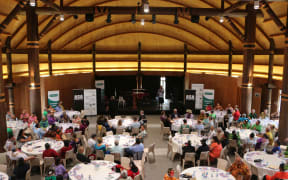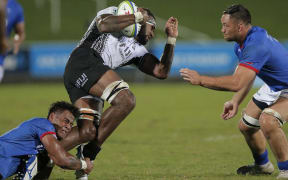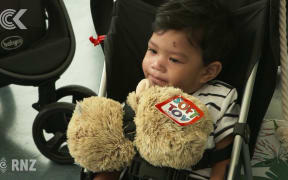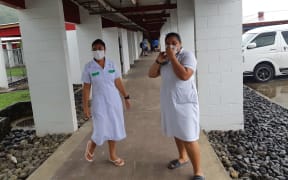Unprecedented state-of-emergency orders come into force in Samoa today in a major push to get everyone immunised against measles.
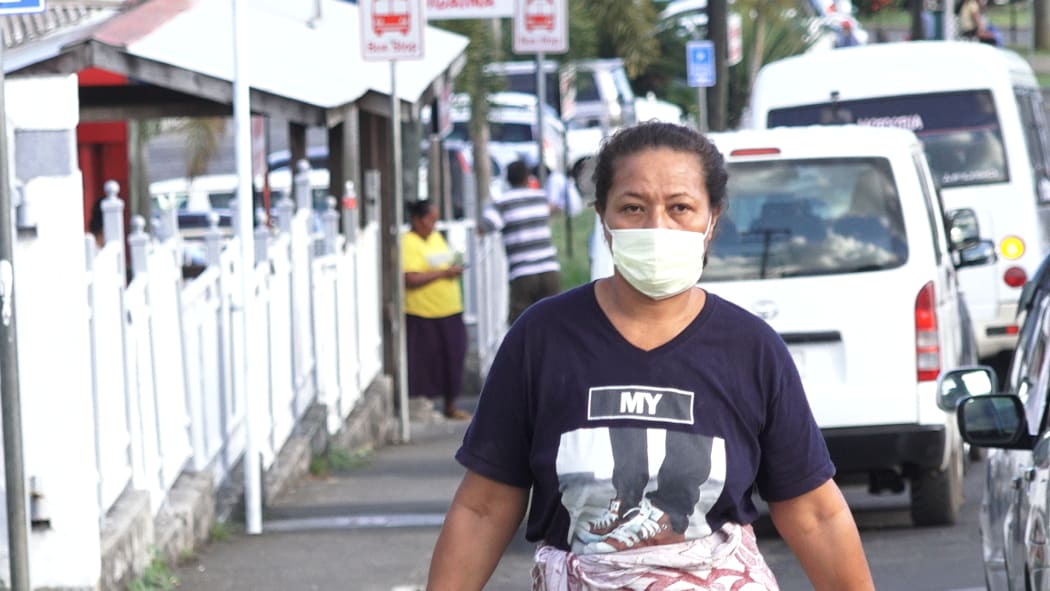
Photo: RNZ / Logan Church
Since the outbreak began in October, 60 people have died and there are more than 4000 confirmed cases of the disease.
The country is shutting down for two days so mobile medical teams can visit people at home who haven't been vaccinated and give them the jab.
The lockdown applies to almost everyone except essential services. Private vehicles are also banned on the roads from 7am until 5pm today.
More than half the country has now been vaccinated, but in the next 48 hours, the government aims to boost that to at least 90 percent.
The door to door vaccination operation is underway in #Samoa as @LoganChurch01 speaks live to @NZMorningReport. Vans are heading out on deserted roads looking for the red cloths. #SamoaMeasles pic.twitter.com/XwuMLtR2vP
— Alex Perrottet (@alexperro) December 4, 2019
Checkpoint reporter Alex Perrottet, who is in Apia, says the orders are very strict and mobile vaccination teams will stop at every home with a red cloth or flag shown outside, indicating unvaccinated people inside.
"Every single family must stay in their home... they can't go outside. And if there is someone in their house who has not been vaccinated they must take a red cloth or garment and go to the front fence or the front of their house, or put it on a pole, but make it very, very visible that their is a red cloth outside their house, which tells the mobile vaccination units that there is someone in there that is yet to be vaccinated," Perrottet reported.
With the shutdown underway, some grieving parents have been rushing to bury their young.
Sole parent Lanuola Naseri was rushing last night to bury her only son, four-year-old Tivoli.
She said she went to ask for help from the Samoa Victim Support Group, because she couldn't afford the white garment to dress her son for burial.
"Why I came to Victim Support today is [because] I'm seeking help for some money to buy the burial suit for my son, and also just trying to see if I'll be able to get some money to help with the food."
This is downtown Apia right now. There's already around 90 teams ready to depart on the mass vaccination drive. Tune in to @FirstUpRNZ to hear how it will all happen. #SamoaMeasles pic.twitter.com/8iOLuooY9m
— Alex Perrottet (@alexperro) December 4, 2019
Aggressive immunisation campaign to help slow rising new cases - WHO
The World Health Organisation says the Samoan government's aggressive response has started to slow the number of new measles cases.
With fatalities climbing, WHO medical officer for the western Pacific Jose Hagan told Morning Report it's difficult to say how high it could reach but expected for the aggressive immunisation response to have an impact soon.
"The cases have been increasing fairly rapidly. However, with the ministry's response - which has been very aggressive - to try and make sure that they're filling in the vaccination gap, providing vaccines for as many people as possible, as rapidly as possible, we're starting to see a bit of a plateau in the rate of new cases."
Samoa stopped its immunisation programme for 10 months when two babies died from a MMR vaccination mixup last year, but has re-started it.
Dr Hagan said he understood the moratorium on the programme may have been lifted on a small scale before March, but by the time it was fully re-started there was a large number of unprotected people.
"When the programme was paused for a few months, that's enough time for a few thousand unvaccinated children to build up. It does create situation where a large group of people are susceptible to the virus and that's sort of the recipe for a large outbreak."
The Samoan government was concerned after the deaths of the two babies last year and "wanted to deal with it in the way that they found appropriate in their context", Dr Hagan said, but they still took WHO's advice into consideration.
"We did not advise them to stop the programme once it was understood that the event had nothing to do with the vaccine itself."
WHO gave support to their Ministry of Health partners in Samoa, as is standard practice, with guidance around the appropriate way to respond and reassure the population, Dr Hagan said.
"We can provide technical advice on the appropriate response and certainly advocate for resumption of immunisation activities as soon as possible and work with the government to provide the correct investigation and public messaging that should follow after an event like this.
"In the end, countries have to make their own decisions about how to deal with their immunisation programme in their own local context. "
The accumulation of unvaccinated children was not the only challenge facing the region when it came to outbreaks, he said.
"The outbreaks are happening in the context of outbreaks all around the world in an extremely connected community in the Pacific - including strong connections to Auckland where there was this large outbreak ongoing in recent months.
"The risk of imported virus into this community, where there was no measles circulating, was certainly very high."
The measles outbreaks occurring all over the world meant that the Pacific islands were particularly vulnerable, he said.
"One thing I want to stress is that this is a global crisis.
"There's outbreaks that are occurring in countries that export travellers, export tourists ... that are spreading this to countries that are small and vulnerable, like the Pacific islands.
"So as long as these outbreaks continue to occur through importation, children are going to be at-risk and unless all countries urgently accelerate their programmes then these outbreaks will continue."
More cases in Fiji
Meanwhile, there are now 16 confirmed cases of measles in Fiji with the latest being another from Suva, the third in the capital.
Authorities say all non-essential travel should be avoided to the Serua/Namosi Subdivision where there are 11 confirmed cases.
Further, all large public gatherings are to be avoided and international travellers are being asked to ensure they are vaccinated at least two weeks before arriving in Fiji.
